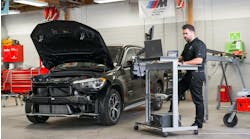Recently the Alliance of Automotive Innovation (Alliance) sent a letter to the U.S. House of Representatives’ Energy and Commerce Committee requesting that the Committee consider legislation that would preclude states from moving forward with vehicle data access legislation for five years. According to the Alliance:
“Due to unique conflicts that automakers are faced with, Congress should act to reaffirm NHTSA’s statutory authority and enforcement guidance to protect the motoring public by temporarily establishing a limited five-year preemption regarding access to telematics data that could compromise vehicle safety due to actions at the state level. A five-year preemption provision would enable Congress and NHTSA to work on a longer term solution to ensure that new cybersecurity, privacy and public safety risks are not created.”
This letter is part of an effort by automakers to circumvent a vehicle data access ballot initiative in Massachusetts which will be decided on election day, November 3. It is not likely that Congress will consider vehicle data access legislation prior to the election.
Of concern to automotive repairers is that any vehicle data access legislation would be considered by Congress that might not directly address access to critical data necessary to repair vehicles and might possibly deter efforts to achieve access. The National Highway Traffic Safety Administration (NHTSA) sent a letter this summer to leaders in the Massachusetts legislature on the upcoming ballot initiative raising safety and cybersecurity concerns. NHTSA referenced its earlier voluntary guidance Cybersecurity Best Practices for Modern Vehicles in its comments. Unfortunately, the NHTSA guidance did little to advance the concerns of automotive repairers in assurances that automakers would provide access to data in the future.
NHTSA stated in its letter to Massachusetts House and Senate leaders the following key points in their summary:
“The ballot initiative requires vehicle manufacturers to redesign their vehicles in a manner that necessarily introduces cybersecurity risks, and to do so in a timeframe that makes design, proof, and implementation of any meaningful countermeasure effectively impossible.
As stated earlier, NHTSA acknowledges the need for serviceability access by authorized third parties and has dedicated a section in its guidance document recommending that the industry not unduly restrict access by authorized alternative third-party repair services. However, steps proposed to ease access for serviceability cannot be allowed to compromise vehicle cybersecurity and public safety.”
There were preliminary automotive industry discussions with automakers towards an industry solution to the vehicle data access but the Alliance letter to Capitol Hill was not helpful towards these efforts. Now little industry progress is anticipated prior to the Massachusetts ballot initiative on November 3.
The Global Alliance for Vehicle Data Access (GAVDA) provided a response to the Alliance letter. GAVDA is a diverse group of global stakeholders and thought leaders united by a common goal of maintaining control by motor vehicle owners over personal and vehicle-generated data. This common goal is to be achieved by preserving and enhancing the current vehicle data environment of open, secure, technology-neutral and direct access by vehicle owners to real-time data. The Automotive Service Association (ASA) is a member of GAVDA. As part of GAVDA’s response, the open letter noted that the automakers’ letter to the U.S. House Energy and Commerce Committee will reduce competition and consumer choice which, in actuality, would prove to be harmful consumers.
Until the ballot initiative is decided in Massachusetts, there is little legislative activity anticipated on vehicle data access. Congress is not expected to address autonomous vehicle, privacy or data access legislation until the new 117th Congress convenes in January 2021.



